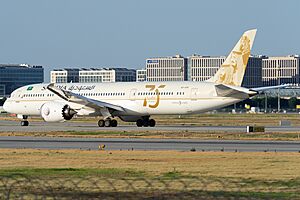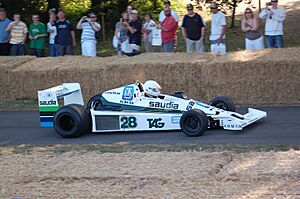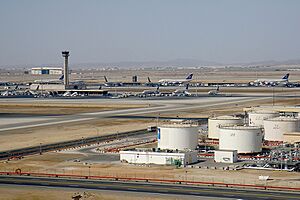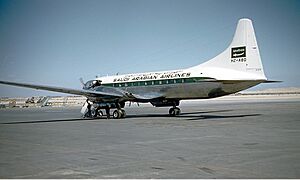Saudia facts for kids

A Saudia Boeing 787-10
|
|
| Founded | 27 September 1945 |
|---|---|
| Hubs | |
| Focus cities | Medina |
| Frequent-flyer program | Al-Fursan Loyalty |
| Alliance | SkyTeam |
| Subsidiaries |
|
| Fleet size | 159 |
| Destinations | 140 |
| Parent company |
|
| Headquarters | Jeddah, Saudi Arabia |
| Key people |
|
Saudia (Arabic: السعودية, romanized: as-Suʿūdiyyah), which used to be called Saudi Arabian Airlines, is the official airline of Saudi Arabia. An official airline like this is often called a flag carrier. The airline is based in the city of Jeddah.
The airline's main airports, or hubs, are King Abdulaziz International Airport in Jeddah and King Khalid International Airport in Riyadh. Saudia flies to over 100 places in Africa, Asia, Europe, and North America. It also operates special charter flights, which are flights that are not on a regular schedule, during the holy times of Ramadan and the Hajj pilgrimage.
In 2012, Saudia joined SkyTeam, a group of airlines that work together. This made it the first airline from the Persian Gulf area to join a major airline group. Saudia is also one of the founding members of the Arab Air Carriers' Organization.
Contents
History
How It All Began

The story of Saudia began in 1945. U.S. President Franklin Delano Roosevelt gave a Douglas DC-3 airplane as a gift to King Abdul Aziz Ibn Saud of Saudi Arabia. This gift helped start the country's own airline.
In September 1945, Saudi Arabian Airlines was created. It was owned by the government and was run with help from an American airline called Trans World Airlines (TWA).
One of its first important jobs was to fly pilgrims to Jeddah for the Hajj. In March 1947, the airline started its first regular flights inside Saudi Arabia. Soon after, it began flying to other countries like Egypt, Lebanon, and Syria.
Growing and Changing
In 1962, the airline got its first jet airplanes, two Boeing 720s. This was a big step forward. The next year, King Faisal of Saudi Arabia signed papers that made the airline a fully independent company. It bought more modern planes like the Boeing 707 and started flying to many new cities, including London, Geneva, and Mumbai.
In the 1970s, the airline got a new look. Its planes were painted white with green and blue stripes. On April 1, 1972, its name was changed to Saudia. It also started flying bigger planes like the Boeing 747 jumbo jet. A special unit was created to fly the Saudi royal family and government officials.
During the 1980s, Saudia grew even more. It started flying to cities all over the world, like New York City, Bangkok, and Nairobi. It also created a business class called Horizon Class for passengers who wanted extra comfort. In 1982, it started its first non-stop flight from Jeddah to New York City.

In the 1990s, the airline added more destinations, including Washington, D.C., and Johannesburg. It also got new planes like the Boeing 777. In 1996, the airline changed its look again. The planes were painted a sandy color with a dark blue tail. The name was changed back to the full Saudi Arabian Airlines.
Modern Times
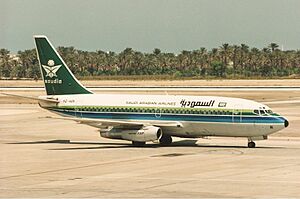
In the 2000s, the Saudi government decided to make the airline more like a private business. This meant that parts of the airline, like food catering and maintenance, were turned into separate companies.
On May 29, 2012, the airline changed its name back to Saudia. This was to celebrate joining the SkyTeam airline alliance. By the end of that year, Saudia had received 64 new airplanes from Airbus and Boeing.
In 2016, Saudia started a new airline called Flyadeal. Flyadeal is a low-cost carrier, which means it offers cheaper tickets with fewer extras. This was part of a plan to make the Saudia Group a world-class company.
Recent Growth and New Look
In the 2020s, Saudia continued to grow. It added new flights to cities like Seoul, Barcelona, and Bangkok. In March 2023, the airline ordered 39 new Boeing 787 Dreamliner planes, showing it plans to keep expanding. By 2030, Saudia hopes to fly to 250 different places.
In September 2023, Saudia surprised many people by changing its look again. It went back to the green and blue design it used in the 1970s. It also introduced a new AI travel helper named "SAUDIA" to help passengers.
Awards
Saudia was named the World's Most Improved Airline in 2017 and 2020 by Skytrax, an organization that rates airlines.
Sponsorships
Saudia has sponsored many sports teams and events. From 1977 to 1984, it was the main sponsor of the Williams Formula One racing team. During that time, the team won two world championships.
More recently, Saudia became the official airline of Formula E, an electric car racing series. One of its planes was painted with a special design to celebrate this. The airline has also partnered with famous soccer and racing teams, including Newcastle United and the Aston Martin F1 Team.
Destinations
As of October 2022, Saudia flies to 102 destinations. The airline has a goal to fly to 250 destinations by the year 2030.
Saudia has codeshare agreements with many other airlines. This means that Saudia can sell tickets for flights operated by these partner airlines, making it easier for passengers to travel to more places. Its partners include members of the SkyTeam alliance and other airlines.
- Aegean Airlines
- Aeroflot
- Aerolíneas Argentinas
- Air France
- Air Mauritius
- China Eastern Airlines
- Delta Air Lines
- Etihad Airways
- Ethiopian Airlines
- Flyadeal
- Garuda Indonesia
- Gulf Air
- ITA Airways
- Kenya Airways
- Korean Air
- KLM
- Kuwait Airways
- Malaysia Airlines
- Middle East Airlines
- Oman Air
- Philippine Airlines
- Royal Air Maroc
- Scandinavian Airlines
- Vietnam Airlines
Fleet
Current Aircraft
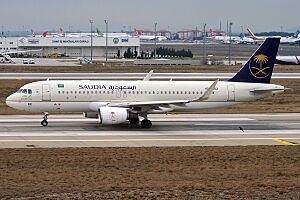

As of August 2025, Saudia operates a modern fleet of Airbus and Boeing aircraft. The airline is always updating its fleet to provide a better experience for passengers.
| Aircraft | In service | Orders | Passengers | Notes | |||
|---|---|---|---|---|---|---|---|
| F | J | Y | Total | ||||
| Airbus A320-200 | 37 | — | — | 12 | 132 | 144 | |
| 20 | 90 | 110 | |||||
| Airbus A321-200 | 15 | — | — | 20 | 145 | 165 | |
| Airbus A321neo | 12 | 62 | — | 20 | 168 | 188 | Order with 35 options. |
| Airbus A321XLR | — | 15 | TBA | ||||
| Airbus A330-300 | 32 | — | — | 36 | 262 | 298 | 1 leased from Wamos Air. |
| 252 | 288 | ||||||
| 30 | 300 | 330 | |||||
| Boeing 777-200ER | 2 | — | — | 6 | 394 | 400 | Leased from Air Atlanta Europe. |
| Boeing 777-300ER | 37 | — | 12 | 36 | 242 | 290 | 2 in VIP configuration, 2 leased from Air Atlanta Europe. |
| — | 30 | 351 | 381 | ||||
| 383 | 413 | ||||||
| 12 | 393 | 405 | |||||
| 14 | 478 | 492 | |||||
| Boeing 787-9 | 13 | 18 | — | 24 | 274 | 298 | Order with 10 options. |
| Boeing 787-10 | 8 | 21 | — | 24 | 333 | 357 | |
| Total | 156 | 116 | |||||
Past Aircraft
Over the years, Saudia has flown many different types of aircraft. Some of these are now retired and can be seen in museums.
| Aircraft | Total | Introduced | Retired | Notes |
|---|---|---|---|---|
| Airbus A300-600 | 11 | 1984 | 2008 | Launch customer. |
| Airbus A330-300 | 1 | 2017 | 2023 | HZ-AQ30 was destroyed during a conflict in Sudan in 2023. |
| Boeing 707-320 | Unknown | 1969 | 1997 | |
| Boeing 720 | Unknown | Unknown | Unknown | |
| Boeing 727-100 | 1 | 1976 | 2000s | Operated for Saudi Arabian Royal Flight. |
| Boeing 727-200 | Unknown | Unknown | Unknown | |
| Boeing 737-200 | 26 | 1972 | 2007 | |
| Boeing 747-100 | 19 | 1981 | 2010 | |
| Boeing 747-100B | 7 | 1979 | 2012 | |
| 1 | 1996 | One plane crashed in 1996. | ||
| Boeing 747-200F | 7 | 1981 | 2012 | |
| Boeing 747-300 | 19 | 1983 | 2013 | Eighth aircraft stored. First aircraft used as VIP/Government transport. |
| Boeing 747-300SF | 1 | 2014 | 2015 | |
| Boeing 747-8F | 2 | 2013 | 2021 | Sub-leased to other operators. |
| Boeing 747SP | 2 | 1981 | 1992 | |
| Boeing 757-200 | 10 | 2008 | 2011 | All fleets were leased. |
| Boeing 767-200ER | 5 | 2003 | 2012 | |
| Boeing 767-300ER | 6 | 2012 | 2012 | |
| Boeing 777-200ER | 23 | 1997 | 2019 | |
| Convair 340 | Unknown | 1960s | 1970s | |
| Embraer ERJ-170 | 15 | 2005 | 2016 | All aircraft stored. |
| Fokker F28 | 2 | 1980 | 1986 | |
| Lockheed L-1011-200 | 17 | 1975 | 1998 | HZ-AHP is currently preserved at Riyadh Aviation Museum. |
| 1 | 1980 | One plane was destroyed in a fire in 1980. | ||
| Lockheed L-1011-500 | 2 | 1970s | Unknown | Operated for Saudi Arabian Royal Flight. |
| McDonnell Douglas DC-8 series | 37 | 1977 | 1998 | |
| McDonnell Douglas DC-10 | 1 | 1975 | 1990s | |
| McDonnell Douglas MD-11 | 2 | 1998 | 2013 | Operated for Saudi Arabian Royal Flight. |
| McDonnell Douglas MD-11F | 4 | 1998 | 2014 | All aircraft stored. |
| McDonnell Douglas MD-90-30 | 29 | 1998 | 2013 | Two aircraft stored. |
In-Flight Services
Saudia has its own magazine for passengers called Ahlan Wasahlan, which means "Hello and Welcome" in Arabic. Because Saudi Arabia is an Islamic country, the airline does not serve any pork or alcoholic drinks.
Many of Saudia's newer planes have Wi-Fi and mobile phone service. Most of their aircraft also have special prayer areas for passengers. Before the plane takes off, a recorded prayer is played.
Incidents and Accidents
Like all major airlines, Saudia has had some accidents in its long history. The airline works hard to make flying as safe as possible.
- On August 19, 1980, Saudia Flight 163, a Lockheed L-1011, caught fire after taking off from Riyadh. The plane returned to the airport, but sadly, all 301 people on board died because of a delay in getting them off the plane.
- On December 22, 1980, a part of the cabin on Saudia Flight 162 broke open during a flight. Two passengers were pulled out of the hole.
- On November 12, 1996, Saudia Flight 763, a Boeing 747, was in a mid-air collision with another plane over India. All 312 people on the Saudia flight and 37 people on the other plane died. This is the deadliest mid-air collision in history.
- On October 14, 2000, Saudia Flight 115 was hijacked by two men. They forced the plane to fly to Baghdad, Iraq. All passengers and crew were released safely.
- On May 21, 2018, a plane flying for Saudia had to make an emergency landing in Jeddah because its front landing gear would not come down. No one was injured.
- On April 15, 2023, a Saudia Airbus A330 was destroyed on the ground at an airport in Sudan during a conflict there. All the crew members escaped safely.
See also
 In Spanish: Saudia para niños
In Spanish: Saudia para niños
- List of airlines of Saudi Arabia
- Red Sea International Airport
- Saudi Vision 2030
-
A Saudia Boeing 777 with a special design for the Saudi Arabia national football team in 2018.
-
A Saudia Boeing 777-300ER with a special Formula E design.
-
A Saudia Cargo Boeing 777F.
-
A Saudia Boeing 747-400 in an older livery.
-
A Saudia Boeing 747-400 leased from another airline in 2012.
-
A Saudi Royal Flight Boeing 747-400 at JFK Airport in 2018.
-
The damage after the fire on Saudia Flight 163 in 1980.



